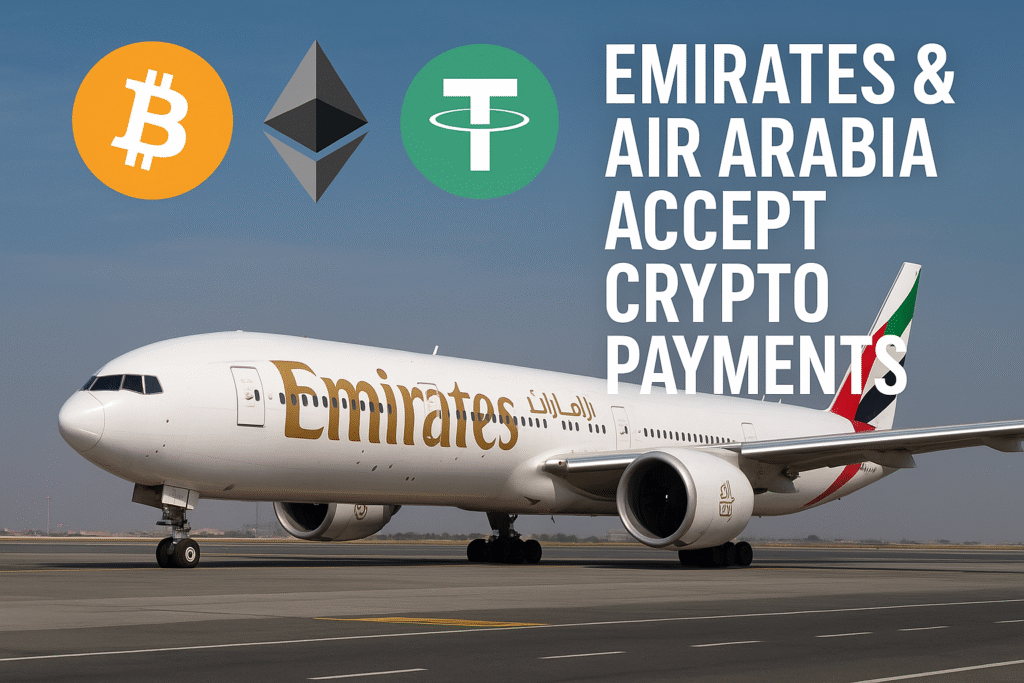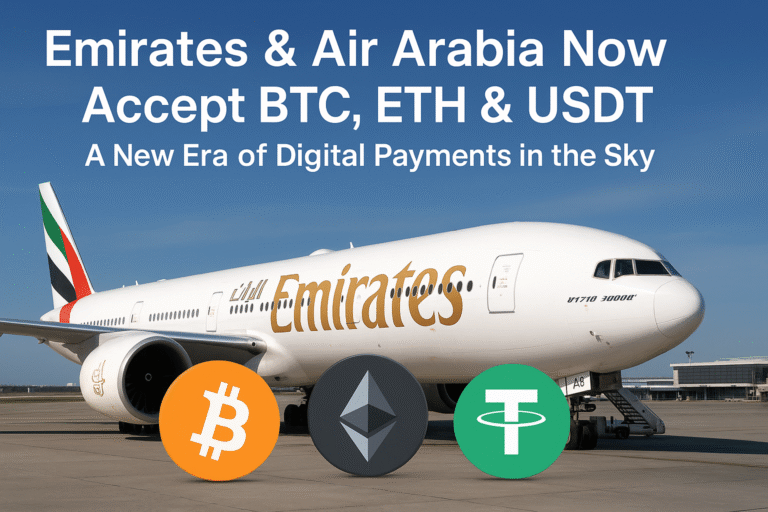Premium Biz Post – The world of aviation has always been at the forefront of innovation, constantly adapting to new technologies and consumer needs. Now, the Middle East is making headlines with a groundbreaking move in the airline industry. Emirates and Air Arabia have officially begun accepting Bitcoin (BTC), Ethereum (ETH), and Tether (USDT) as payment methods for their tickets and services. This marks not just a shift in how people can pay for air travel but a bold step into the future of global digital finance.
In this article, we will dive into what this decision means for passengers, how it changes the travel landscape, and why this is being considered a turning point for both the airline and cryptocurrency industries.
The Digital Revolution Takes Off in Aviation
Over the past decade, cryptocurrency has gone from being a niche interest to a major player in the global economy. Airlines, as international businesses, have long recognized the need to adapt to changing financial trends. By embracing BTC, ETH, and USDT, Emirates and Air Arabia are positioning themselves as pioneers of digital transformation in aviation.
This move not only enhances customer convenience but also reflects the growing acceptance of digital assets in everyday life. For frequent flyers, especially business travelers and digital nomads who rely on decentralized finance, this shift is a game-changer.

Why Emirates and Air Arabia Made the Move
Several factors have contributed to this groundbreaking decision:
- Growing Demand from Customers
More travelers, particularly from younger demographics, prefer using digital currencies over traditional banking systems. Accepting crypto payments opens doors for a wider global audience. - Global Reach of Cryptocurrencies
Unlike local currencies that face conversion challenges, cryptocurrencies like BTC, ETH, and USDT are universally recognized. This makes it easier for international passengers to book flights without worrying about exchange rates. - Innovation as a Brand Strategy
Emirates, known for luxury and premium travel, and Air Arabia, recognized for its affordable yet reliable services, both strengthen their brand images by embracing cutting-edge payment technology. - Financial Efficiency
Digital currencies reduce transaction costs and eliminate the delays associated with traditional bank transfers, making the booking process faster and smoother.
The Benefits for Passengers
Accepting cryptocurrency payments is not just a headline-making decision; it delivers real value to passengers. Here are some of the key benefits travelers can now enjoy:
- Borderless Payments: Passengers can pay in BTC, ETH, or USDT from anywhere in the world without needing to convert money into local currencies.
- Faster Transactions: Crypto payments are processed much faster compared to international bank transfers or credit card payments that often face verification delays.
- Security and Transparency: Blockchain technology ensures secure, transparent transactions, reducing the risk of fraud.
- Flexibility: Travelers who invest in crypto can now directly use their assets for practical purposes like booking flights, rather than converting them into fiat currency first.
This level of flexibility reshapes the passenger experience, making it more aligned with the digital economy.
BTC, ETH & USDT: Why These Three?
The choice of Bitcoin, Ethereum, and Tether is not accidental. These three cryptocurrencies are among the most widely adopted worldwide.
- Bitcoin (BTC): The first and most recognized cryptocurrency, often referred to as “digital gold.” It is trusted globally as a store of value and a reliable payment method.
- Ethereum (ETH): Beyond being a currency, Ethereum powers a vast ecosystem of decentralized applications. Its flexibility and popularity make it a practical choice for payments.
- Tether (USDT): As a stablecoin pegged to the US dollar, Tether eliminates the volatility risk commonly associated with crypto, giving travelers a stable and predictable option for transactions.
By offering this trio, Emirates and Air Arabia cover the spectrum of crypto needs: stability, flexibility, and global recognition.
The Middle East: A Hub for Innovation
It’s no surprise that Emirates and Air Arabia are leading this movement. The United Arab Emirates (UAE) has been positioning itself as a hub for blockchain innovation and digital finance. Dubai, in particular, has introduced friendly regulations and initiatives to foster cryptocurrency adoption.
With these airlines headquartered in the region, their decision reflects a broader national vision of embracing Web3 technologies and digital transformation. This alignment between government policy and private sector innovation creates fertile ground for further advancements in aviation and fintech.
How It Impacts the Airline Industry Globally
This announcement is likely to set a trend for other international airlines. While some carriers have experimented with crypto payments in the past, Emirates and Air Arabia bring credibility and scale to the movement. Their entry could trigger a wave of adoption across the industry.
Key implications include:
- Competitive Advantage: Airlines that accept crypto will attract tech-savvy travelers, giving them an edge over competitors.
- Global Standardization: If more carriers adopt similar systems, cryptocurrency payments may become a standard option in aviation.
- Integration with Travel Ecosystems: Hotels, booking platforms, and car rental services may follow, creating an entire travel ecosystem powered by digital currencies.
This move could very well redefine the way the entire travel industry handles payments.
read more : “Smart DIY Transform Everyday Items into Unique Works“
Challenges Ahead
While this is an exciting development, there are also challenges to consider:
- Volatility of Crypto Markets: Except for stablecoins like USDT, cryptocurrencies can fluctuate wildly in value, which may pose risks for both airlines and passengers.
- Regulatory Landscape: Different countries have varying rules on cryptocurrency, which could complicate global adoption.
- Technical Infrastructure: Airlines must ensure seamless integration of crypto payments into their systems, including refunds, cancellations, and customer service.
Nevertheless, the benefits seem to outweigh the challenges, especially as global financial systems move toward greater acceptance of digital assets.
What This Means for Travelers
For passengers, this new payment option is more than just a novelty—it’s a sign of the times. Travel is becoming more digital, more connected, and more convenient. Paying with BTC, ETH, or USDT gives travelers:
- The freedom to move across borders with fewer financial restrictions.
- A futuristic experience that matches the innovation they expect from leading airlines.
- Greater inclusivity, as people without traditional banking access can still book flights using crypto.
This is not just about payments—it’s about empowerment and accessibility in global travel.
Looking Ahead: The Future of Digital Payments in the Sky
The decision by Emirates and Air Arabia is a bold step into a new era where air travel and digital finance merge seamlessly. As blockchain and Web3 technologies continue to evolve, we may soon see airlines offering more crypto-based services—such as loyalty programs built on blockchain, NFT-based tickets, or even decentralized travel platforms.
This integration signals that the skies are no longer just about flying; they’re about creating a digital-first travel experience. For travelers worldwide, this means more freedom, more flexibility, and more innovation.



